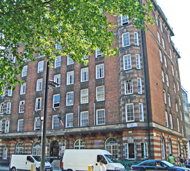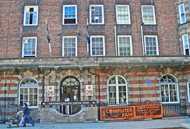for Officers
Military
In 1915 the Endsleigh Palace Hotel, which had originally been designed as a hotel with a nursing home in the top apartment, was requisitioned by the War Office for use as a hospital for officers. The building was placed rent-free at the disposal of the governing Hospital Committee, under the Chairmanship of Sir Archibald Williamson, on the understanding that it would open as soon as possible.
The Hotel was thoroughly cleaned and converted into a hospital with 100 beds; it opened in July 1915. It had two operating theatres and a sterilising room. An X-ray apparatus was installed. One of the lifts was large enough to take stretcher cases.
The War Office paid the ordinary allowance of 3 shillings (15p) a day per patient towards the costs of running the Hospital, but this was completely inadequate and the deficit was met by private donations. Some £6,000 had already been received, but it was estimated that between £15,000 and £20,000 was needed to maintain the Hospital for a year.
Major L. Haden Guest, RAMC, was appointed by the War Office as the resident Military Commandant. The nursing staff was under the supervision of the Matron, Miss Florence Tubbs, who had trained at Guy's Hospital. The trained nurses were assisted by male nursing orderlies, who acted as probationers and also as valets for the patients. The Committee felt that officers would not care to be nursed by girls who might one day be their partners at a dance (far better that female probationers nurse the 'Tommies' whom they would never see again). The Committee also felt that officers would get rather nervy if attended by inexperienced girls, but they would be happy with trained nurses.
Each morning and afternoon two ladies served tea and coffee in the 'still room' on each floor, thus relieving nurses of this duty. The volunteers provided their own fire-proof teapots and coffee pots, white china plates and toast racks.
On Friday 8th October 1915 the Matron, Miss Tubbs, was summoned by the Hospital Chairman, Sir Archibald Williamson, and informed that the Committee desired her to leave at once, and that she should leave the next day as if she was going away for the weekend.Lady Williamson, the Hospital Secretary and wife of Sir Archibald, then interviewed the Sisters and head cook, and attempted to persuade them to withdraw their resignations, telling them that the War Office had told them to dismiss the Matron. A member of staff then rang the War Office, who knew nothing of the affair.
On Friday, 15th October, Miss Tubbs was summoned to the Executive Committee. She was refused permission to bring some of the senior Sisters as witnesses as to what was said. Miss Tubbs asked the Committee for the accusations against her to be put into writing, but the Committee preferred the word 'complaints' rather than 'accusations'.
Miss Tubbs was scheduled to leave the Hospital by 2 o'clock on Saturday, 16th October, when the new Matron (Miss C.B. Leigh from the Cleveland Street Infirmary) and staff would come on duty. Carrying a bouquet of pink roses presented to her by the Voluntary Aid Detachment (V.A.D.) workers, she departed, together with the nursing and domestic staff who had resolved to leave with her. The Commandant of the V.A.D. also withdrew his members because of the 'unproved aspersions so cruelly cast upon the reputation of the nursing staff'. The London/50 V.A.D took over as a temporary measure.
The nursing press had by now got hold of the story, taking Matron's part, and complaining that a few persons of wealth were allowed control of auxiliary military hospitals without the slightest understanding of trained nursing standards or sanitary or domestic science.
The nursing staff of the Hospital appealed to Lord Kitchener, the Secretary of State for War, to intervene, as the Hospital was supported by state funds from the War Office. A delegation was received by the Under Secretary of State for War, Mr. H.J. Tennant, who declared the War Office had no power to intervene and that it was a matter for the Hospital Committee to decide. The patients, some 52 officers, had written a petition to the Assistant Director of the Medical Service in praise of the work of the senior nursing staff and regretting their departure, and demanding an enquiry into the matter.
Less than two weeks after her dismissal, Miss Tubbs departed for her new post as Matron of the Hopital Militaire Anglais at Nevers, France.
On 30th October the British Journal of Nursingpublished a letter from Miss Tubbs stating she still had no inkling as to why she had been dismissed with a day's notice, and one week's salary of £3 in lieu of notice. Miss Tubbs also wrote to Lord Kitchener, petitioning for a thorough investigation into the circumstances of her summary discharge. The Under Secretary of State for War responded on his behalf, stating that the matter was a domestic affair between the Hospital Commitee and herself, thereby absolving the War Office of any responsibility. His letter also contained the statement that 'there has been no reflection on your character from first to last'.
With Sir Archibald as Chairman and his wife as Honorary Secretary, the Hospital Committee remained opposed to any enquiry (the medical officer in charge, Major Haden Guest appears to have been strangely silent). There the matter seems to have ended, but not without some scalding comments from the nursing press.
During the war the Joint War Committee had endowed 30 beds at the Hospital for the immediate medical treatment of sailors and soldiers who had contracted tropical diseases while on active service. In 1919 the Seamen's Hospital Society acquired the building for use by the Hospital for Tropical Diseases.
Present status (June 2009)
The building is currently occupied by University College London Union.

25 Gordon Street.

The main entrance.
(Author unstated) 1925 The British Red Cross Society. County of London Branch Annual Reports 1914-1924. London, Harrison & Sons.
http://rcnarchive.org.uk (July 1915)
http://rcnarchive.org.uk (October 1915)
Return to home page